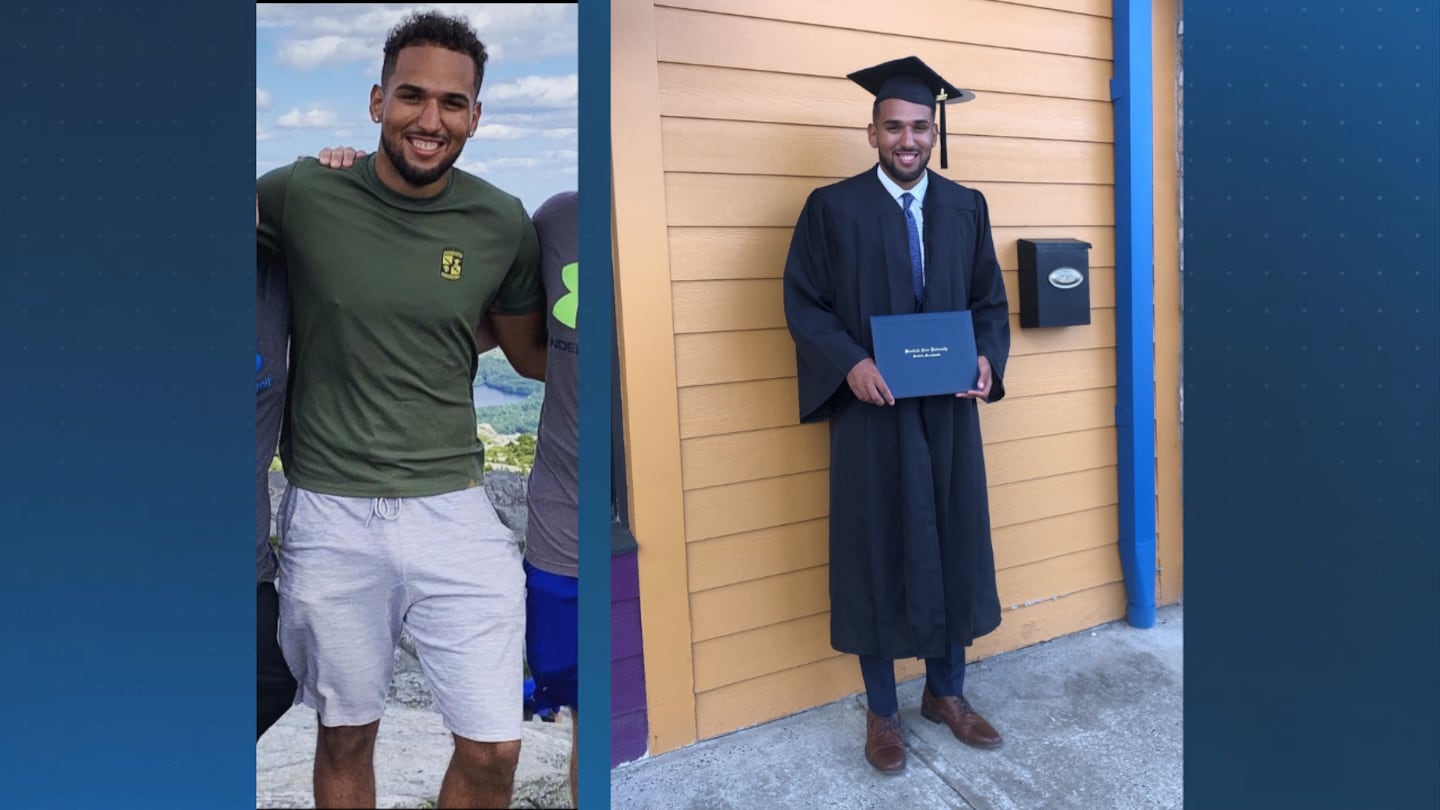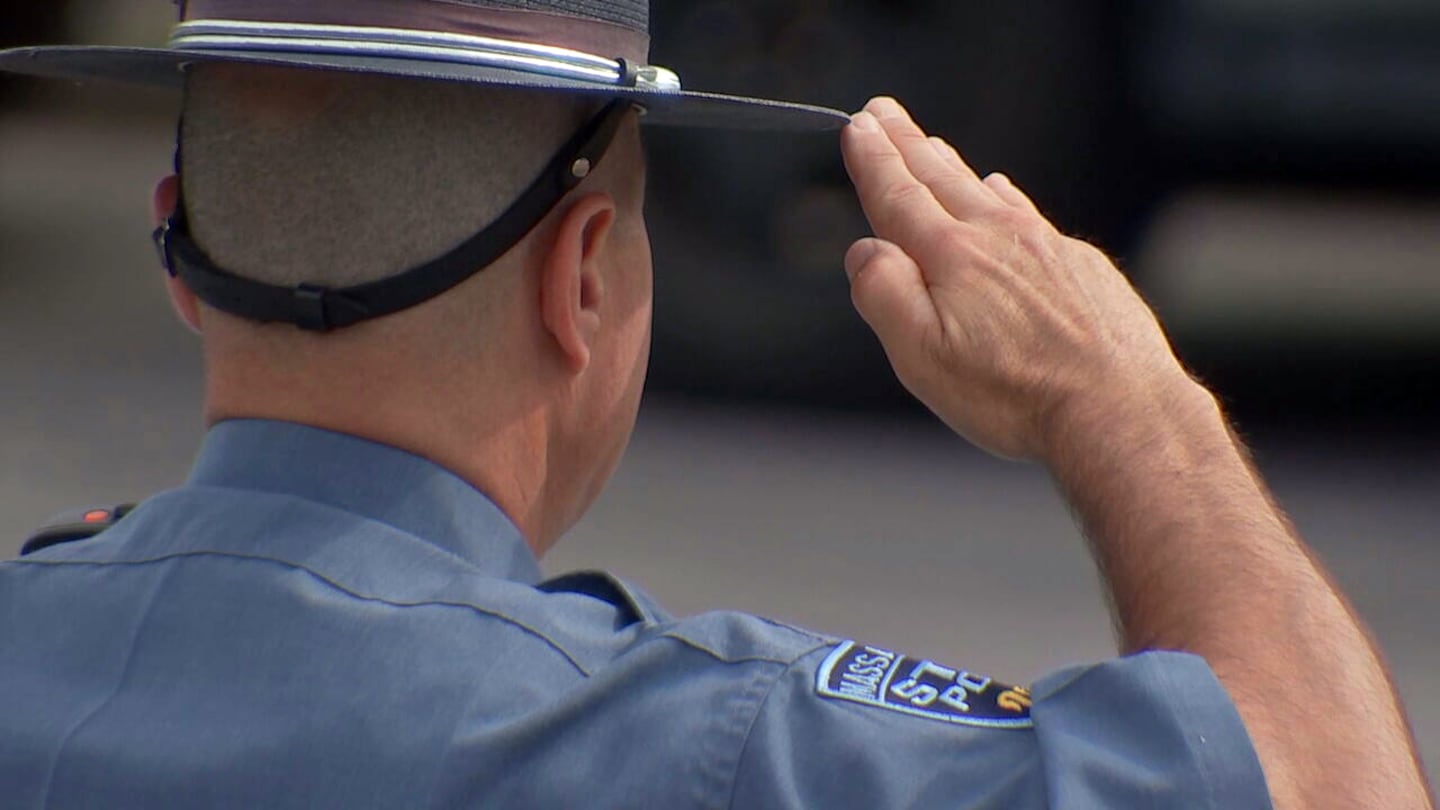FRAMINGHAM, Mass. — The Massachusetts State Police on Thursday announced a series of training reforms “to enhance recruit training and ensure the highest standards of safety and effectiveness” following the death of a recruit in September.
Massachusetts State Police recruit Enrique Delgado-Garcia, of the 90th Recruit Training Troop at the Academy in New Braintree, died in September after suffering a “medical crisis” during a defensive training exercise.
The new measures, released Thursday ahead of the next Recruit Training Troop, include dividing the upcoming class into two smaller cohorts, appointing new Academy leadership and completing an hour-by-hour review of the training curriculum, state police said in a statement.
Todd McGhee served from 1998 to 2008 as the defensive tactics coordinator for Massachusetts State Police, leading programs at their training academies.
“We’re seeing state police taking change serious,” McGhee told Boston 25 Thursday. “They’re embracing change, and they’re open to change... It’s all about lessons learned, and in that process, it’s about being transparent.”
The measures also include commissioning the International Association of Chiefs of Police to conduct an independent assessment of the State Police Academy.
“These initiatives reflect the Department’s commitment to ensuring the Academy’s training programs and practices meet the highest standards of safety and effectiveness while addressing the evolving needs of modern policing,” state police said.
In response to Gov. Maura Healey’s directive, “the Department has taken steps to align the Academy’s programs, policies and practices with modern public safety needs, evolving societal expectations and best practices,” state police said.
“The State Police will bifurcate the next academy class into two smaller groups of recruits. One group will begin in May and the other will begin later this summer,” state police said. “This new structure will allow Academy instructors to better address the individual needs of each recruit, strengthen mentorship, and promote overall readiness. This year’s bifurcated class will serve as a pilot program to assess its impacts on recruits.”
The measures come months after Delgado-Garcia‘s death.
McGhee has been closely following the case of Enrique Delgado-Garcia.
He continued, “When a tragedy hits, it has a significant impact to everyone... We want to learn from this we want to move on from this but we want to move on the right way.”
“We continue to mourn the loss of Trooper Delgado Garcia and extend our deepest condolences to his loved ones,” Massachusetts State Police Geoffrey Noble said in a statement.
“We remain dedicated to ensuring our Academy’s programs and training practices uphold the highest standards of safety while preparing our recruits to serve with excellence and distinction,” Noble said. “These new measures, including the IACP’s assessment, will enhance our training model, reduce attrition, and prepare troopers to meet the demands of modern policing.”
The department continues to cooperate with an independent investigation led by David Meier, who was appointed by Attorney General Andrea Campbell, into the death of Delgado-Garcia, Noble said.
“The Massachusetts State Police Academy plays a vital role in preparing the next generation of troopers to protect and serve our communities statewide,” Noble said. “We are committed to ensuring our training environment fosters professionalism and excellence while prioritizing the health and well-being of our recruits.”
Noble elevated the role of Academy Commandant from the rank of Detective Lieutenant to Captain.
He has appointed Captain David Pinkham, a 20-year veteran with a broad range of management experience in field, investigative, and standards and training functions, to serve as the new Commandant of the Academy.
In this role, Pinkham will oversee the selection of teaching staff for the upcoming Recruit Training Troop.
In addition, Academy staff have completed an hour-by-hour review of recruits’ experiences at the Academy “to ensure all training fosters a supportive environment with the appropriate balance of high-intensity activities with periods of rest and recovery,” state police said.
The boxing program remains suspended.
During his time, McGhee also oversaw the boxing training that is now on hold.
“If it does continue, you’ll see significant changes in the protocols,” he explained. “Those physical requirements will also probably be a part of the oversight, making sure you have recruits who are fit to go through the training regiment.”
Boston 25 reached out to Attorney General Andrea Campbell’s office Thursday regarding the status of Meier’s investigation, but has yet to hear back.
State police also did not say if anyone is facing disciplinary action in regard to Delgado-Garcia’s death, citing the ongoing review.
The department will evaluate the impact and outcomes of these adjustments to determine whether they should be adopted as a model for future Recruit Training Troops.
In January, the Department released a Request for Proposals seeking to identify independent experts to conduct a comprehensive review.
A strategic sourcing team of leaders from across the department evaluated submissions and recommended IACP for its clear plan to assess the Academy and provide recommendations based on their extensive experience in all areas of training and law enforcement.
With support from the Executive Office of Public Safety and Security, the Department approved the selection of the IACP.
State police said the review will focus on critical areas, including, but not limited to:
· Training Programs and Methods: A thorough analysis of all current training modules will be conducted, including physical fitness requirements, classroom instruction, and scenario-based training. The evaluation will focus on the relevance, efficacy, and safety of the paramilitary training model currently in use as it relates to the roles and responsibilities of State Troopers. Additionally, it will consider the curriculum’s alignment with modern policing needs, such as community engagement, de-escalation, and occupationally relevant physical assessments.
· Attrition and Injury Rates: The review will analyze trends in attrition rates for the last ten academy classes, with particular attention to candidate preparation and suitability, causes of dropout, such as injury, academic failure, and voluntary withdrawal. Disparities in attrition rates across gender, race, and other demographic factors will be examined, along with the financial and operational impacts of high attrition rates.
· Injury Prevention and Fitness Standards: The evaluation will assess fitness standards in selection and training to ensure they align with national best practices for injury prevention. They will also review the relevance of physical fitness assessments in selection and training (e.g., running time trials) in relation to the occupational demands of policing and identify gaps in selection processes for recruits’ physical and psychological readiness. Recommendations will be provided to strike the appropriate balance between physical stress and injury prevention.
· Organizational Culture and Leadership: The assessment will evaluate the role of academy leadership and instructors in creating a safe and professional training environment. 1gvf45It will also review processes for instructor oversight, accountability, and remediation in cases of misconduct or unsafe practices. The costs and benefits of communal living arrangements on recruits’ mental health, physical health, and overall performance in the Academy and as Troopers will be assessed.
· Alignment with National Standards: The Academy’s practices will be benchmarked against national and international models in police training, including models from POST-certified academies and peer agencies recognized for innovation. An analysis will be conducted to compare the Academy’s training standards and methods to job-based performance metrics from other jurisdictions, as well as evaluate the Academy’s preparedness to address societal changes and evolving public expectations of policing.
“The comprehensive evaluation of the Academy’s programming, training methodologies, and organizational culture will provide actionable recommendations aimed at enhancing safety, improving recruit retention, and ensuring sustained excellence,” state police said.
“As part of its commitment to transparency and community engagement, the Department will share the findings publicly when they become available,” state police said.
This is a developing story. Check back for updates as more information becomes available.
Download the FREE Boston 25 News app for breaking news alerts.
Follow Boston 25 News on Facebook and Twitter. | Watch Boston 25 News NOW
©2025 Cox Media Group







